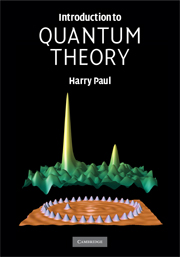5 - Philosophy
Published online by Cambridge University Press: 04 June 2010
Summary
Schrödinger's cat states
A prerequisite to getting quantitative information on the microscopic world is the existence of measuring apparatuses that indicate definite measuring results.The idea that a pointer of a measuring device is itself in an indeterminate state waiting for someone to make the wavefunction for the combined system (object + measuring apparatus) collapse by simply having a look on the apparatus, thus reading it out, appears absurd. I think, there is no doubt that measuring devices will behave like other objects in the macroscopic world in which there is no place for ‘intrinsic’ uncertainty.
Actually, this fact becomes questionable, at least it needs further theoretical investigation, when it is claimed that the quantum mechanical description applies also to macroscopic bodies, in particular measuring devices. (There are physicists who do not shrink back from attributing a single wavefunction even to the whole universe!) The dilemma originates from the quantum mechanical rule following from the linearity of the Schrödinger equation, that a pure quantum state remains a pure quantum state during its evolution. So, assuming that both the microscopic system to be observed and the measuring apparatus are initially in a pure state each, the combined system (object + measuring apparatus) will still be in a pure state after the interaction has taken place. Hence one will need ‘someone’ to bring about the collapse of the wavefunction. (In a realistic approach to this problem, the agent is recognized to be the environment with its virtually infinite number of degrees of freedom.) Schrödinger, being fully aware of this dilemma, illustrated it ingeniously through a fictitious ‘diabolic device’.
- Type
- Chapter
- Information
- Introduction to Quantum Theory , pp. 93 - 104Publisher: Cambridge University PressPrint publication year: 2008



